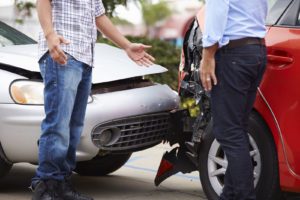- Wisconsin is an at-fault state
- Drivers are required to carry $10,000 for property damage and $25/$50,000 for injury or death
- No-fault insurance plans do not always allow consumers to seek damages for pain and suffering
When getting insurance in the state of Wisconsin, it’s important to know what your potential liabilities are if you’re ever involved in a car accident. When you understand the risks, you can shop around for the best insurance at rates that will suit your budget.
Enter your zip code above to find car insurance rates that work for your budget in Wisconsin!
What is no-fault car insurance?
No-fault insurance is used to describe any insurance program where policyholders recoup losses from their own insurance company regardless of who caused the collision.
In these states, motorists can only sue for pain, suffering, and severe injuries if their damages exceed certain thresholds or meet other criteria. There are currently 12 no-fault states, including:
- Florida
- Michigan
- New Jersey
- New York
- Pennsylvania
- Hawaii
- Kansas
- Kentucky
- Massachusetts
- Minnesota
- North Dakota
- Kentucky
The goal of a no-fault system is to allow accident victims to recover their losses in a timely manner by going through their own companies. It’s also viewed as a way to limit litigation and help ease the burden on the court systems.
By contrast, a tort system generally requires that drivers who are at fault pay for the resulting damages and injuries. As an injured party, you can also seek compensation for loss of wages and pain and suffering.
One of the major differences between the two systems is the need for Personal Injury Protection. With a no-fault system, you have to carry PIP to cover your own medical expenses. Under a tort system, you won’t need to carry extra medical coverage if you already have protection through your medical insurance plan.
Although tort systems do allow policyholders to bring legal action against an at-fault party, the fact is that 90 percent of all cases are settled without requiring this type of action.
Wisconsin Uses a Fault-Based System

When purchasing car insurance in Wisconsin, you’ll be under a traditional fault system. You will have a few options open to you after an auto accident, including:
- Filing a claim with your insurance company
- Working with the at-fault driver’s insurance company or filing a third-party claim
- Go through the civil court system and seek a judgment
The big complaint with traditional systems is that you may have to wait a little while to receive compensation after an accident. When you have your coverage through PIP and your insurance provider, you can receive a faster payout. However, there are benefits associated with traditional insurance programs.
One advantage is that you can save money by dropping the PIP coverage that can turn into a financial burden. Another benefit is that you can seek compensation for pain and suffering.
You’ll also be able to have the at-fault driver cover the repair bills to your car or personal property that is damaged, so you can feasibly walk away from the accident with zero financial losses.
Free Car Insurance Comparison
Compare Quotes From Top Companies and Save
Mandatory Coverage in Wisconsin
Wisconsin requires that drivers carry a minimal level of coverage, but you can find better rates on plans by shopping around. Before you sign up for any insurance policy, be sure that you have at least:
- $10,000 for property damage
- $25,000 for injury or death of one person
- $50,000 for injury or deaths of multiple people
You’ll also be required to carry proof of insurance with you when you get behind the wheel. Failure to produce the insurance card can result in fines or license suspension.
Who pays in a car accident?

In Wisconsin, it’s important to assign fault so that the guilty party can take care of the damages and injuries. Once fault is established by the law or the insurance companies, the responsible person will have to cover all damages, including pain and suffering.
There are limited tort insurance policies available, but they limit your ability to file suit after an accident.
However, they do come with more affordable premiums. If you want the peace of mind that comes with comprehensive coverage, then you should look at full tort policies that grant injured parties unlimited rights to pursue lawsuits.
Legal Ramifications for Not Carrying Car Insurance in Wisconsin
The minimum requirements for auto insurance are clearly outlined by the state, and failure to have the basic levels of $10,000/$25,000/$50,000 can result in serious consequences. If you’re found guilty of causing a car accident, and you don’t have insurance, then you can have your license suspended.
In order to get your license reinstated, you may have to provide the state with a special SR-22 certificate. Furthermore, motorists who are driving without insurance are personally responsible for covering damages out of their own personal assets. In order
Protecting Yourself

Additional coverages are available for you to protect yourself. You can invest in uninsured and underinsured motorist coverage so that you can quickly recoup your losses if you’re struck by someone who does not have adequate protection levels.
Remember that liability insurance is only for the damages to another person’s vehicle. If you need to get your car fixed after causing an accident, then you’ll need to have collision coverage. If your car is hit by a falling tree limb or damaged in a storm, then comprehensive coverage would restore your vehicle.
Finding the Best Car Insurance Coverage in Wisconsin
When you call ten different companies, you’ll receive ten different quotes. However, you don’t just want to buy the cheapest coverage. In addition to being affordable, the company should also provide you with great customer service and have an excellent financial stability rating.
A comparison company can provide you with all the information you need, including quotes, customer reviews, and information on a company’s overall health. You can then make a fully informed decision about your new insurance company.
Before making your final decision, ask about available discounts. Reputable companies of all sizes are offering special discounts to:
- Good drivers and good students
- People who have multiple vehicles or policies with the same company
- Drivers who complete special safety classes
Policy renewal is a great time to consider making the switch because you won’t have to worry about any pro-rating, cancellation fees, or pro-rated refunds. Before automatically signing up for another term, take a few minutes to enter your information and see if another company can provide you with a better plan.
Enter your zip code below to compare car insurance rates from multiple companies at once!


